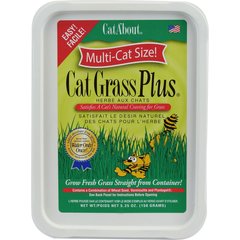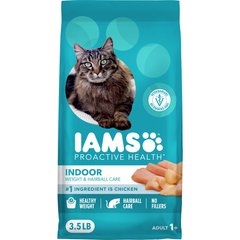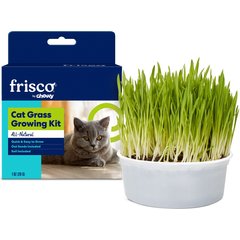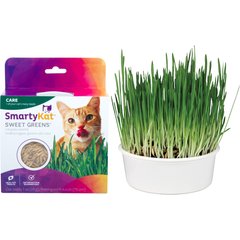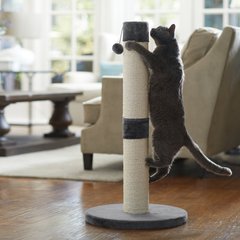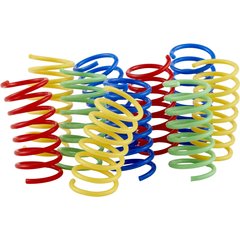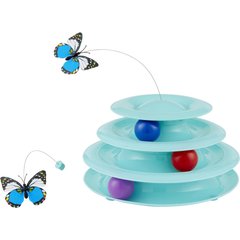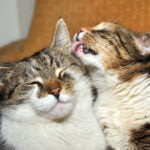Why Do Cats Eat Grass? Is This Normal?
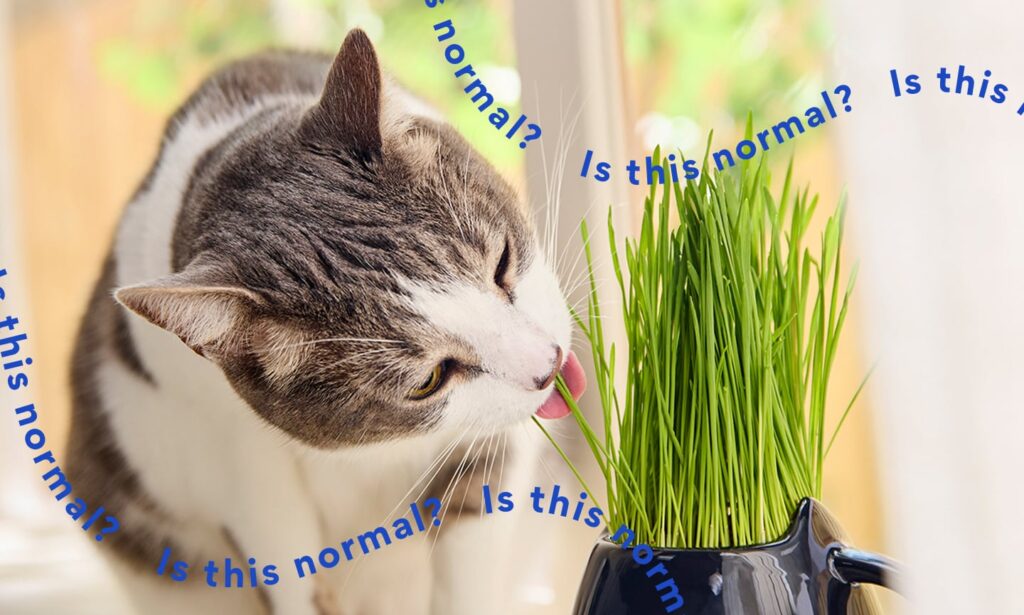
Photo by Chewy Studios
Q: My kitty eats grass whenever we go outside for walks or hang out on the patio. She seems to love nibbling on blades of grass any chance she gets—it’s as if she savors every bite! Why do cats eat grass? And is it normal?
A: Yes, it’s totally normal for cats to eat grass. Typically, cats enjoy eating grass because it’s instinctual, mentally stimulating, and tasty, among other reasons.
We talked with experts to learn more about this herbivorous grazing behavior, including why cats do it, when it might be a concern, and how to prevent it.
Can Cats Eat Grass?
Yes! In most instances, it’s safe for cats to eat grass, and it’s indeed a very typical behavior—even for indoor cats, says Cristy Brusoe, certified cat behaviorist and founder of Cat Training by Cristy in Tampa Bay, Florida.
While grass doesn’t provide the nutritional value that their regular food does, cats might instinctually chew on it for a variety of reasons, Brusoe adds.
And even though eating grass is generally harmless, there are times when it can be unsafe and might warrant a veterinary visit.
Why Is My Cat Eating Grass?
Catch your inquisitive cat munching on grass and foliage? There are several explanations why your kitty might indulge in greenery—most of which are perfectly normal for a healthy cat.
Here are some common reasons why cats eat grass.
They Like It
Though it might seem strange, our carnivorous kitties might just be curious to explore grass and even think it’s appetizing enough to eat. (The same applies to cat-friendly plants.)
“Some cats might simply enjoy the sensory experience of eating grass, finding pleasure in its texture, taste, or smell,” says Katy Miller, DVM, CVFT, CVNAN, director of veterinary services at BSM Partners in Olympia, Washington.
They’re Bored
From knocking over our prized possessions to zooming around the room, it’s no secret that cats find countless ways to keep themselves entertained. Snacking on grass gives them something to investigate, nibble on, and pass the time.
Some cats just enjoy chewing, and when it’s coupled with boredom, a cat will potentially chew on grass, especially if they need extra stimulation, Brusoe says.
It’s Instinctual
Despite being domesticated for centuries, our cats still have a wild side that might show itself in behaviors like grazing on grass.
Eating plants played a role in the ongoing purging of intestinal parasites in felid ancestors who were often exposed to these parasites, says Maggie Placer, DVM, veterinary science program manager at EveryCat Health Foundation and owner of Placer Veterinary Care in Lafayette, Louisiana. Younger cats ate plants more often and tended to appear ill and vomit less frequently than older cats.
Although more research is needed, it’s likely that eating grass serves a biological purpose. It’s believed that younger cats eat plants more often because they have less immunity to parasites and are actively growing, Dr. Placer explains.
It Provides Digestive or Nutritional Benefits
“Why do cats eat grass?” is a question many researchers have tried to find a definitive answer to. One hypothesis is that a dietary deficiency in some trace nutrients could lead to plant eating in cats.
Some people believe that grass helps the digestive process for cats or that grass might provide a trace nutrient that’s beneficial, such as folic acid, Brusoe says.
Two cat-safe grass options that support digestive health and contain essential nutrients are Pet Greens Live Grass Cat Treat and Miracle Care Cat A’bout Cat Grass Plus.
Recommended Products
They’re Stressed or Anxious
Stress can impact cats in various ways, prompting them to seek comfort.
Cats might use grass-eating as a self-soothing mechanism or for anxiety relief, potentially helping to calm themselves when stressed or anxious, Dr. Miller says. Studies have shown that cats exhibit reduced stress behaviors after eating grass, which supports this theory.
It Can Induce Vomiting
Some experts believe cats might chew on grass to induce vomiting, particularly if they ate something that upset their stomach, like fur or prey, Brusoe says. This might also help them expel hairballs.
They Have Gastrointestinal Issues
In some cases, eating grass can be a sign of a gastrointestinal (GI) issue. An increase or decrease in the level of interest a cat shows toward grasses they’re exposed to could suggest a change in the cat, such as nausea or discomfort, Dr. Placer says.
Should I Be Concerned Over My Cat Eating Grass?
Eating grass is an extremely common behavior in cats. However, there are certain situations when it isn’t always normal.
According to our experts, grass-eating can be concerning if you notice the following in your cat:
- Frequent or excessive grass-eating
- Throwing up more than twice a month after eating grass
- Signs of illness (such as lethargy, appetite loss, diarrhea, blood in stool, or vomit) after eating grass
- Unusual behaviors accompanying grass consumption, such as changes in appetite, water intake, or litter box habits
Additionally, cats should avoid eating grass if it’s from a chemically treated lawn and should avoid any unknown plants outdoors, as there are many common plants that are poisonous to cats.
If you suspect your cat has eaten something they shouldn’t have, call your vet or Pet Poison Helpline (855-764-7661; a fee applies) right away.
How Do I Stop My Cat From Eating Grass?
Does your cat nibble and gnaw on grass like it’s nobody’s business? If you’d like to stop this behavior to help keep them safe from potential risks, our experts share these tips on how to do so.
Consider Hairball-Control Food or Supplements
Dr. Miller recommends monitoring to see whether eating grass seems to be producing hairballs in your cat. If so, she says hairball-support food or supplements can be a solution to helping your cat get rid of hairballs.
Highly rated hairball-control food and supplements include Iams Proactive Health Indoor Weight & Hairball Care and Pet Honesty Hairball Control Supplement.
Recommended Product
Provide Cat-Friendly Grass Alternatives
Offer cat-safe grass seed so your kitty can chew on grass in a safe, supervised environment, Brusoe says.
A couple of our favorite grasses for cats include Frisco Natural Cat Grass Growing Kit and SmartyKat Sweet Greens Cat Grass Seed Kit.
Recommended Products
Keep Them Engaged With Enrichment Activities
Food puzzles, climbing opportunities, scratching posts, and window perches can help keep your furry friend active and sharp.
“Regular play sessions can reduce boredom and stress, while rotating toys and environments keep things fresh and exciting,” Dr. Miller says.
Recommended Products
Use Positive Reinforcement
Redirect your cat’s interest from eating undesired grasses to playing with interactive toys and games by introducing them when your cat first shows interest in the grass.
Reward them with a treat when they engage with the toy or game to encourage a positive association with these forms of enrichment instead, Dr. Placer says.
Recommended Products
Supervise Their Time Outdoors
If your feline friend spends time outdoors or wants to, Dr. Miller recommends supervising their time outside or creating a catio or enclosed outdoor area to ensure their safety. This prevents them from ingesting grass that’s been treated with pesticides, herbicides, or chemical fertilizers.
Minimize Stressors
One way to prevent your cat from eating grass is by relieving their stress. You can reduce stress in their environment by providing hiding spots and vertical spaces, as well as maintaining a consistent routine, Dr. Miller notes.
Review Their Diet With a Vet
Has your cat taken a sudden interest in eating grass? To make sure your feline’s diet is balanced and rich in nutrients, consult your vet to review it.
If your cat is behaving in a compulsive manner in which there’s excessive grass-grazing, this could indicate an unrecognized behavioral or a medical issue, Brusoe says
It’s best to consult your vet or a feline behaviorist to determine the underlying cause and address their individual needs accordingly.
FAQs About Cats Eating Grass
Q: Is lemongrass safe for cats?
A: No, lemongrass is not safe for cats, according to the ASPCA. Although it’s considered to be only mildly toxic and might result in stomach upset, it’s best to keep your cat away from lemongrass in any form.
Q: Why is my cat eating grass and vomiting?
A: Some experts believe cats might chew on grass to induce vomiting if they have an upset stomach from something else they ate, or to get rid of excess hair that causes hairballs.
Vomiting or diarrhea after eating grass could also signal gastrointestinal upset or obstruction, Dr. Miller notes.
Q: Does grass itself make cats throw up?
A: Yes, grass can make cats throw up. This is a common reaction that can happen on occasion if a cat eats too much grass.


